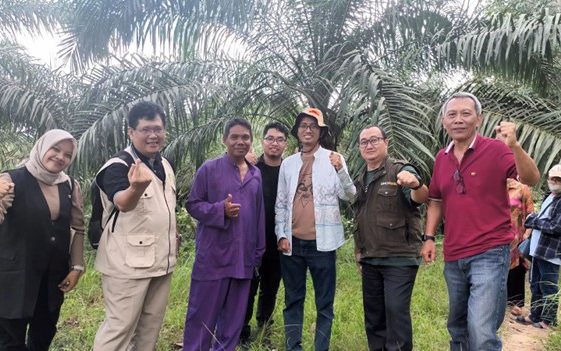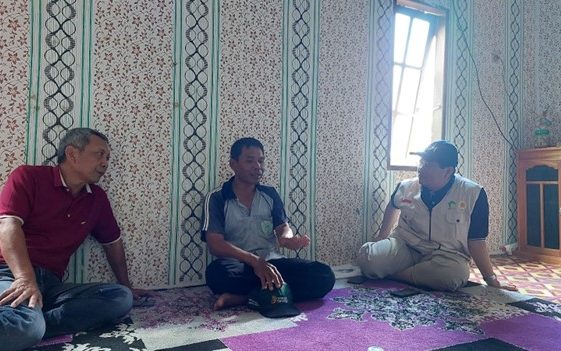Yogyakarta, May 12, 2024 – On May 10, 2024, the Faculty of Biology at UGM visited a palm oil plantation managed by APKASINDO in Penajam Paser Utara Regency, East Kalimantan. The activity consisted of discussion and a field visit to a palm oil plantation. During the opening remarks of the visit, Prof. Dr. Budi Setiadi Daryono, M. Agr. Sc., The Dean of the Faculty of Biology UGM, stated the visit was aimed to understand the issues faced by palm oil plantations, including production challenges and the real conditions experienced by the community. He hoped that the Faculty of Biology UGM could grasp the process of palm oil cultivation from growth to its re-utilization as valuable products, especially within local communities, and foster cooperation in research, community service, and education sectors.
Following this, there was a discussion with Mr. La Ode Hitua Hubaisi, a palm oil farmer since 2010, an APKASINDO administrator, and the chairman of a cooperative in his district. He is part of the Setia Kawan Farmers Group, which consists of 98 members with a total plantation area of approximately 317 hectares. He mentioned that the presence of the IKN directly impacts palm oil plantations in Kalimantan, as urban expansion leads to competition with plantations. Mr. La Ode emphasized the importance of cooperatives that bridge the gap between farmers and Palm Oil Mills (PKS).
The cooperative in Penajam is the largest community cooperative partnering with PKS and has been operational for five years, even before the pandemic. This cooperative ensures that PKS fairly purchases palm oil bunches from farmers, valuing their hard work. Currently, cooperatives have been established in each district with funds collected from personal contributions, allowing farmers to collectively benefit from the profits. Mr. La Ode expressed concern over the resistance against cooperatives, although cooperatives actually benefit palm oil farmers by preventing exploitation by middlemen who collect substantial profits. Moreover, with the 2025 ISPO policy, Palm Oil Mills (PKS) are required to partner with cooperatives to facilitate both local and export marketing.”We must not give up. If we do, no one else will fight for it,” he said. Part of the cooperative’s profits is allocated to education funds. Scholarships for college are provided through the Palm Oil Plantation Fund Management Agency (BPDPKS) to 3-4 children of palm oil farmers or laborers and non-palm oil farmers. This visit opens the possibility for selected local youth contributing to the advancement of palm oil to study at Universitas Gadjah Mada.
Mr. La Ode also explained the processes of seeding, planting, maintenance, pruning, harvesting, disease management, and the production lifespan of palm oil. One of the cooperative’s programs discusses the use of a combination of organic and inorganic fertilizers. The Faculty of Biology has been using small-scale leaf and litter shredders, hoping that similar methods can be applied by palm oil farmers for pruned leaves and fronds. Next, the Faculty of Biology UGM team visit the palm oil plantation accompanied by Mr. Fauzul ‘Didiek’ Idhi and guided by Mr. La Ode, who explained the planting procedures and regulations implemented by the Penajam Farmers Group, East Kalimantan. The activity concluded with a group photo.
The visit is expected to contribute to the achievement of Sustainable Development Goals (SDGs). Through this training, we aim to address four crucial points of the 17 SDGs: SDGs 4; quality education, SDGs 8; decent work and economic growth, SDGs 9;industry, innovation, and infrastructure, and SDGs 17; partnerships for the goals. Additionally, this activity represents an IKU 6 achievement for the Faculty of Biology UGM as it involves exploring cooperation with private companies or the general public. It also contributes to education by recommending potential BPDPKS scholarship recipients and generating research ideas eligible for BPDPKS grants.This visit is expected to provide insights to the Faculty of Biology and palm oil farmers through joint discussions and enhance cooperation with partners, contributing to sustainable development beneficial for all parties involved. [UGM Palm Oil Research Team]





